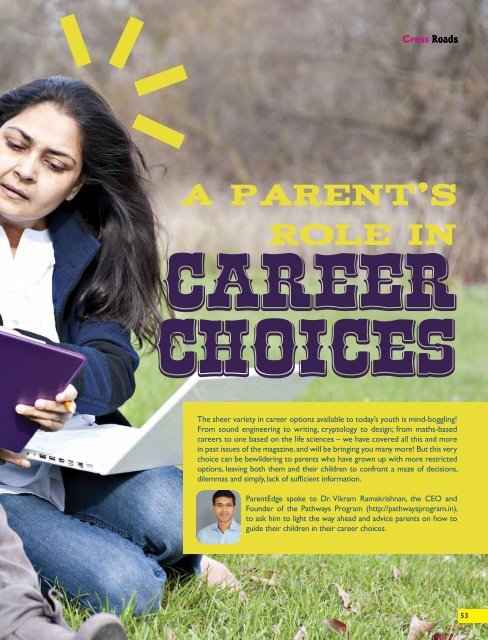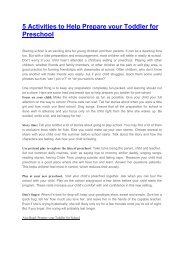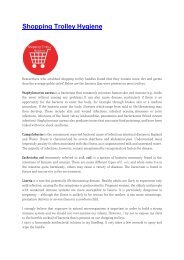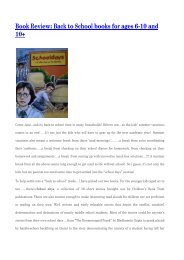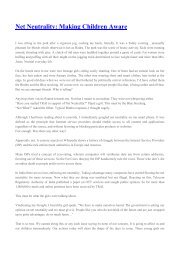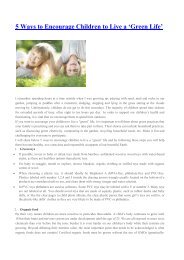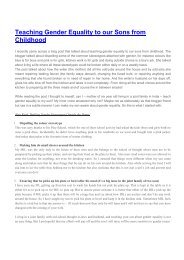A Parent’s Role in Career Choices
The Pathways Program is an education services enterprise that provides career guidance and skill development
The Pathways Program is an education services enterprise that provides career guidance and skill development
You also want an ePaper? Increase the reach of your titles
YUMPU automatically turns print PDFs into web optimized ePapers that Google loves.
The sheer variety <strong>in</strong> career options available to today’s youth is m<strong>in</strong>d-boggl<strong>in</strong>g!<br />
From sound eng<strong>in</strong>eer<strong>in</strong>g to writ<strong>in</strong>g, cryptology to design; from maths-based<br />
careers to one based on the life sciences – we have covered all this and more<br />
<strong>in</strong> past issues of the magaz<strong>in</strong>e, and will be br<strong>in</strong>g<strong>in</strong>g you many more! But this very<br />
choice can be bewilder<strong>in</strong>g to parents who have grown up with more restricted<br />
options, leav<strong>in</strong>g both them and their children to confront a maze of decisions,<br />
dilemmas and simply, lack of sufficient <strong>in</strong>formation.<br />
ParentEdge spoke to Dr. Vikram Ramakrishnan, the CEO and<br />
Founder of the Pathways Program (http://pathwaysprogram.<strong>in</strong>),<br />
to ask him to light the way ahead and advice parents on how to<br />
guide their children <strong>in</strong> their career choices.<br />
May - June 2013<br />
53
The Pathways Program is an education<br />
services enterprise that provides career<br />
guidance and skill development programmes<br />
to high school and college students.<br />
More than 5000 students are enrolled<br />
<strong>in</strong> The Pathways Program across schools<br />
<strong>in</strong> Hyderabad, Chennai, Coimbatore and<br />
Bangalore. Pathways also contributes a<br />
regular bimonthly column – Road Map – to<br />
the Education Plus supplement of The H<strong>in</strong>du.<br />
Dr. Ramakrishnan believes that career<br />
guidance is not just about help<strong>in</strong>g a student<br />
choose between science and commerce or<br />
the right college. It should actually help<br />
students understand what work<strong>in</strong>g <strong>in</strong>volves,<br />
analyse their <strong>in</strong>terests and strengths, and<br />
then choose a career that is right for them.<br />
When high-schools students are decid<strong>in</strong>g<br />
which area of study to pursue at the<br />
undergraduate level, who or what<br />
<strong>in</strong>fluences this decision – peers, parents,<br />
or teachers?<br />
Parents cont<strong>in</strong>ue to be the key <strong>in</strong>fluencers<br />
of this decision. If not parents, it could<br />
be other members of the larger family like<br />
uncles/aunts or <strong>in</strong> some cases, friends of<br />
parents. Peers are next. Teachers actually<br />
play a m<strong>in</strong>imal role.<br />
What role do parents play <strong>in</strong> <strong>in</strong>fluenc<strong>in</strong>g<br />
their children’s choice of career today?<br />
Most parents have a plan <strong>in</strong> m<strong>in</strong>d for<br />
their children. The roles played could<br />
be proactive, where the parent acts as a<br />
facilitator and helps the child understand<br />
the options available, or reactive where<br />
not much time and thought is given to the<br />
decision. Ideally, parents should discuss<br />
this <strong>in</strong> depth with their children, and<br />
the specifics of the situation should be<br />
addressed. Let me expla<strong>in</strong> the two roles by<br />
talk<strong>in</strong>g about two situations and the types<br />
of <strong>in</strong>terchange that can occur:<br />
facts. On prob<strong>in</strong>g, it is clear that the son’s<br />
sudden <strong>in</strong>terest <strong>in</strong> medic<strong>in</strong>e was <strong>in</strong>fluenced<br />
by a television serial (Grey’s Anatomy).<br />
But unfortunately what is shown <strong>in</strong> these<br />
serials is not the real picture of healthcare.<br />
The father wants his son’s decision to be<br />
based on an <strong>in</strong>formed view of a career <strong>in</strong><br />
medic<strong>in</strong>e and not by the glamour of what’s<br />
shown on television. Hence, he arranges<br />
a six-week programme for his son, where<br />
the latter shadows doctors and tries to<br />
understand the ‘real world’ of medic<strong>in</strong>e. In<br />
this case, the parents are help<strong>in</strong>g the child<br />
understand specifics of the career so he can<br />
make an <strong>in</strong>formed decision.<br />
Example 2 – reactive/bad conversation:<br />
Father – Son, do eng<strong>in</strong>eer<strong>in</strong>g.<br />
Son – I am not <strong>in</strong>terested <strong>in</strong> eng<strong>in</strong>eer<strong>in</strong>g.<br />
Father – What do you want to do?<br />
Son – I don’t know ….<br />
Father – Then do eng<strong>in</strong>eer<strong>in</strong>g!<br />
In today’s world, the roles parents play<br />
have to expand and more time should<br />
be devoted to career-choice discussions.<br />
There is a press<strong>in</strong>g need to <strong>in</strong>crease ‘good<br />
conversations’!<br />
In your op<strong>in</strong>ion, to what extent should<br />
a parent <strong>in</strong>fluence a child’s choice of<br />
career?<br />
Parents have to play a major role as the<br />
role of school teachers <strong>in</strong> our country is<br />
m<strong>in</strong>imal, unlike <strong>in</strong> the west where schools<br />
have a counsellor who assists considerably<br />
<strong>in</strong> the process. S<strong>in</strong>ce this is not a<br />
straightforward decision to make, gett<strong>in</strong>g<br />
it right is important. It is the parent’s<br />
duty to present all the variables to their<br />
children, have a frank discussion about<br />
their f<strong>in</strong>ancial assets and <strong>in</strong>vestments, and<br />
explore and understand the child’s <strong>in</strong>terest<br />
and strengths. Sufficient time should be<br />
<strong>in</strong>vested <strong>in</strong> structured discussions.<br />
Example 1 – proactive/good conversation:<br />
A parent who is runn<strong>in</strong>g a flourish<strong>in</strong>g<br />
bus<strong>in</strong>ess may not immediately warm up<br />
to the idea of his son do<strong>in</strong>g medic<strong>in</strong>e.<br />
However, <strong>in</strong>stead of dissuad<strong>in</strong>g the son,<br />
the father seeks to ensure that he makes a<br />
fully <strong>in</strong>formed decision based on the right<br />
54<br />
May - June 2013
Are parents more accept<strong>in</strong>g of children’s<br />
<strong>in</strong>terest and choices, especially when<br />
they are not ma<strong>in</strong>stream?<br />
Parents today have def<strong>in</strong>itely become<br />
more accept<strong>in</strong>g of children’s choices.<br />
The def<strong>in</strong>ition of ma<strong>in</strong>stream itself has<br />
broadened! Even until just 15 years ago,<br />
children could choose only between<br />
eng<strong>in</strong>eer<strong>in</strong>g, medic<strong>in</strong>e or commerce, but<br />
now the def<strong>in</strong>ition of ma<strong>in</strong>stream <strong>in</strong>cludes<br />
Hotel Management, Human Resources<br />
Management, Bus<strong>in</strong>ess Management, and<br />
Languages – mak<strong>in</strong>g a career as a translator<br />
is well accepted. Parents see that there<br />
are more options and also realise that they<br />
may not be as <strong>in</strong>formed as their children<br />
about these choices – hence, they are<br />
more will<strong>in</strong>g to consider their children’s<br />
decisions. Of course, there is still some<br />
resistance to more unusual choices – if the<br />
child says he wants to become an actor for<br />
<strong>in</strong>stance – as these still fall outside what<br />
is def<strong>in</strong>ed as ma<strong>in</strong>stream and parents are<br />
concerned about the success of the child.<br />
I th<strong>in</strong>k as long as parents see a ‘credible<br />
plan of action’ they will be more accept<strong>in</strong>g<br />
of different choices.<br />
Do you see a difference <strong>in</strong> the way<br />
parents approach career choices <strong>in</strong><br />
metros vs. tier-2 towns?<br />
In metros, parents (and children) have<br />
access to a wider variety of people <strong>in</strong><br />
different careers. Hence, their awareness<br />
levels are higher than those from smaller<br />
towns and they, therefore, tend to be more<br />
open. However, the approach to select<strong>in</strong>g<br />
a career is not significantly different – <strong>in</strong><br />
both regions, there is an overwhelm<strong>in</strong>g<br />
importance placed on the selection of the<br />
course and college, and less on the actual<br />
career the child is go<strong>in</strong>g to pursue.<br />
Could you name a few factors that<br />
<strong>in</strong>fluence a parent’s choice? Do you f<strong>in</strong>d<br />
these reasonable?<br />
• Familiarity with the choice, their<br />
experience or a friend’s/family<br />
member’s experience: For example,<br />
a family of doctors may not resist too<br />
much if their child wants to become<br />
a chartered accountant, as they may<br />
be aware of many successful chartered<br />
accountants.<br />
• Successful role models: If parents are<br />
not familiar with the child’s choice,<br />
they will look for successful role<br />
models <strong>in</strong> that field.<br />
• The parents’ own unfulfilled dreams:<br />
For example, compell<strong>in</strong>g their child<br />
<strong>in</strong>to a career <strong>in</strong> sports; or if their<br />
own choice of career has made them<br />
unhappy, this will prompt them to<br />
discourage the child from choos<strong>in</strong>g<br />
the same.<br />
F<strong>in</strong>ances are not seen as an <strong>in</strong>fluencer,<br />
but more as a constra<strong>in</strong>t; and there<br />
are numerous ways to overcome these<br />
constra<strong>in</strong>ts. For example, an expensive<br />
professional degree need not be the only<br />
path to become an Investment Banker or<br />
a Brand Manager – there could be other<br />
paths. In many cases, once the child<br />
is clear on what he wants to do, he can<br />
identify different ways to get there!<br />
Dr. Ramakrishnan recommends<br />
three areas students and parents<br />
should pay attention to when<br />
<strong>in</strong>vestigat<strong>in</strong>g various career<br />
options:<br />
Interest: Check if <strong>in</strong>terest<br />
actually matches with what your<br />
child <strong>in</strong>tends to do – for example<br />
<strong>in</strong> the case of medic<strong>in</strong>e, is he<br />
really <strong>in</strong>terested <strong>in</strong> <strong>in</strong>teract<strong>in</strong>g<br />
with people and help<strong>in</strong>g them?<br />
Skills: Does he have the<br />
required skills, or the<br />
opportunity to develop these<br />
skills? What is required to be<br />
successful as a doctor is different<br />
from what is required to get<br />
a medical college seat. For the<br />
latter, you need to secure high<br />
grades and score well <strong>in</strong> an<br />
entrance test. But to become<br />
a great surgeon, for example,<br />
you need excellent hand-eye<br />
coord<strong>in</strong>ation and f<strong>in</strong>e motor<br />
skills, the ability to work well<br />
under pressure, empathy, and<br />
good communication skills.<br />
Lifestyle: Does his vision of<br />
the lifestyle he envisages actually<br />
match the career choice? For<br />
example, if you become a<br />
management consultant, you may<br />
have to travel a lot and be away<br />
from your family for a large part<br />
of the week. Is this someth<strong>in</strong>g<br />
that he is prepared to do? So<br />
your child may need to reconcile<br />
his expectations to reality.<br />
May - June 2013<br />
55
R Sridhar, an <strong>in</strong>novation coach<br />
based <strong>in</strong> Mumbai (and an expert<br />
on the ParentEdge panel),<br />
recently conducted a workshop<br />
called ‘I WISH’ with students<br />
of Grade 9. The workshop<br />
facilitated a discussion on career<br />
choices by help<strong>in</strong>g students<br />
understand their top five talents,<br />
and then us<strong>in</strong>g these to explore<br />
career options. His reflections<br />
are captured below:<br />
“Parents should play the role<br />
of a facilitator. They need to<br />
acknowledge that today’s<br />
children could know much<br />
more than they do. ‘I am the<br />
parent and older, so I am<br />
right’ is no longer valid! As a<br />
facilitator, the parent should<br />
first listen, without judg<strong>in</strong>g if<br />
the child is right or wrong.<br />
Children see the parents’<br />
role as very important <strong>in</strong> the<br />
decision-mak<strong>in</strong>g process. So<br />
we should avoid forc<strong>in</strong>g them<br />
<strong>in</strong>to the dilemma of reconcil<strong>in</strong>g<br />
their wishes with their parents’.<br />
“Parents should understand<br />
that the child is at a crossroads.<br />
They don’t want to rebel, they<br />
want a resolution. If they are<br />
shown a reasonable way, which<br />
stems from understand<strong>in</strong>g, they<br />
are will<strong>in</strong>g to listen.”<br />
What advice would you give parents on<br />
be<strong>in</strong>g good facilitators <strong>in</strong> this process?<br />
• Realise it is an important decision, and<br />
be proactive and not reactive.<br />
• Invest time and approach the<br />
discussion <strong>in</strong> a structured manner. Do<br />
not let it happen like the ‘flavour of<br />
the day’; rather, get <strong>in</strong>to specifics.<br />
• Start the discussion early – <strong>in</strong> Grade 9,<br />
as <strong>in</strong> our country the child has to make<br />
a choice of subjects after Grade 10.<br />
• Keep the channels of communication<br />
open. Be accept<strong>in</strong>g so that the child<br />
can share hopes, fears and dreams with<br />
you. This will help children be open<br />
about their choices rather than simply<br />
make statements which they th<strong>in</strong>k<br />
their parents want to hear.<br />
• Seek professional help to facilitate<br />
the process better and do your best to<br />
make children understand the ‘world of<br />
work’.<br />
56<br />
May - June 2013
Learn<strong>in</strong>gs from a<br />
<strong>Parent’s</strong> Journey:<br />
Sudha Kumar, with a<br />
daughter <strong>in</strong> Grade 11<br />
Reassure your children that it’s f<strong>in</strong>e to be<br />
unsure: Some children are sure about what<br />
they want to do while others are not. At this<br />
stage, children can become anxious, especially<br />
if their peers have clarity and they themselves<br />
don’t. As parents, we need to assure them that<br />
they still have time to make up their m<strong>in</strong>ds,<br />
and it is more important to focus on do<strong>in</strong>g well<br />
at school at this stage.<br />
Be open about the choices your children<br />
make: The idea is to help your children explore<br />
options. So, as wild as their choice may seem<br />
to you, do not dismiss it offhand. Keep an<br />
open m<strong>in</strong>d and try and understand why they<br />
are th<strong>in</strong>k<strong>in</strong>g about a particular area. A few<br />
discussions can lend clarity to both the child<br />
and you. She may either outgrow the idea or<br />
identify new areas to explore; alternately she<br />
may conv<strong>in</strong>ce you on its merits!<br />
Take outside help: As I knew next to noth<strong>in</strong>g<br />
about my child’s area of <strong>in</strong>terest, I spoke to a<br />
few people and set up a couple of meet<strong>in</strong>gs for<br />
my daughter. This helped to give her a realistic<br />
picture of what she could expect from her career.<br />
Th<strong>in</strong>k of ways to ascerta<strong>in</strong> <strong>in</strong>terest: Many<br />
children do not have the exposure to really<br />
decide whether they are passionate about a<br />
subject while they are <strong>in</strong> high school. So they<br />
often simply pick subjects they do well <strong>in</strong>. No<br />
harm <strong>in</strong> that, but it may also be good to explore<br />
further by organis<strong>in</strong>g <strong>in</strong>ternships with friends/<br />
family or ask<strong>in</strong>g the child to do a summer project<br />
by choos<strong>in</strong>g a topic from the area of <strong>in</strong>terest.<br />
Do your own research: One of the challenges<br />
that parents face today is a lack of understand<strong>in</strong>g<br />
of the choices available. As your child approaches<br />
high school, become well-<strong>in</strong>formed yourself by<br />
talk<strong>in</strong>g to people and read<strong>in</strong>g a lot. Assimilate<br />
what is before you so that when the time comes<br />
you can actually facilitate the process.<br />
May - June 2013<br />
57


